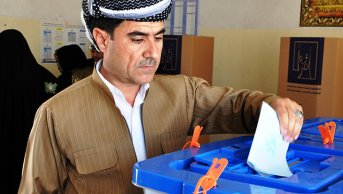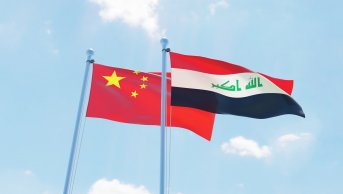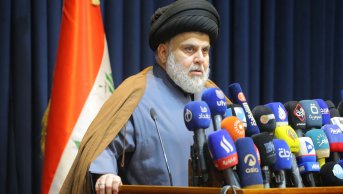Where is Barzani in the Turkey-PKK tension?

2013 was a year of gain from all dimensions for Kurds. Syrian Kurds, who saw the dynamism coming with the reference of the Arab Spring beginning in 2011 as an opportunity, sought to fortify their power in the north of the country. After Democratic People’s Party’s (PYD), known as PKK’s Syria branch, efforts for alliance with regime forces, Assad withdrew its troops from the area and Turkey found PYD on the other side of its border. Assad’s tactical move had some positive impacts for the solution process in Turkey on the one hand; however, it paved the way for PKK to increase legitimacy on the other. We can say that PYD’s gaining a status in Rojava is an important factor in Turkey’s Kurdish policy.
After ISIS’s offensive on Mosul in Iraq, PKK found a chance to absolve its global ‘terrorist organization’ image partially with its military support to Iraqi Kurdistan Regional Government’s (KRG) peshmergas. PYD’s defensive for Kurdish town of Kobani in October 2014 against ISIS let PYD’s and PKK’s, which are declared as terrorist organizations by Turkey, popularization around the world. Despite Turkey’s support for global coalition to fight against ISIS, PKK did not abstain from using President Recep Tayyip Erdogan’s statement “We do not want a Kurdish establishment in our south” as a part of its propaganda that claims Turkey is supporting ISIS.
Why did PYD choose Assad?
Allegations that claim Turkey has been supporting ISIS became obsolete with organization’s suicide attack in Suruç that claimed 32 lives and killing a Turkish soldier in Kilis last week. While the impact of the Suruç suicide attack is still echoing, which is accepted as an ISIS attack, PKK intensified its attacks in Turkey. PKK’s ending two year-old ceasefire led Ankara to bomb PKK positions in Qandil, northern Iraq. At this point, it can be stated that PKK’s beginning armed assaults signals a paradigmatic change.
PYD’s taking over Tal Abyad and connecting Jazeera and Kobane cantons disturbed Ankara seriously with the potential establishment of a Kurdish corridor in the southern borders of the country. In response, Ankara declared its intension to establish a 90 km buffer zone between Mare and Jarablus in order to prevent a second move by PYD. Buffer zone statements caused serious hesitations among Kurdish public opinion.
Turkey’s Rojava policy irritates PKK as the tension around the Syrian border and the solution process are interrelated with each other. PKK gives paramount importance to the region since it gives the legitimacy that the organization has been seeking. Even more, it is a reality that PKK might discard the solution process in Turkey for the sake of region’s future.
After the possibility of PYD’s forming a corridor in northern Syria, Turkey replied positively to the US’ insistence to join the coalition against ISIS and opened its military bases to the coalition. In return, Turkey convinced US for the buffer zone. Turkey started the bomb ISIS positions after organization’s killing a military officer by opening fire at the border. At the same time, Ankara began to conduct operations inside the country against ISIS.
Assad regime made an important move in this critical situation. The regime declared an amnesty decree for deserters and former soldiers that joined to opposition groups. PYD responded to the claims that the regime is suffering a shortfall in the army with an unexpected move. PYD leader Saleh Muslim signaled his intention to strengthen their position in Tehran-Damascus alliance by stating “Syrian army could return to the region with a new understanding and conditions. Then, YPG might become a part of the army. However, the return cannot be accepted if it takes place with the Baath logic and intelligence.” Muslim, who emphasized that PYD will never give up its gains in Syria, pointed out that Assad should stay in power by saying “We are fighting for a democratic and federal Syria.”
Current campaign against PKK and the buffer zone move in northern Syria pushed PKK/PYD openly to an alliance with the regime in Damascus. PYD embarked on a new adventure by choosing Iran and run the risk of losing its gains that it has made so far. Indeed, PKK’s alliance with Iran since 2011 is already a known fact. Considering consolidated Iran impact in Rojava, Muslim’s statements form an understandable basis.
It would not be an exaggeration to state that Turkey and the US want to develop a new paradigm on the issue of PKK. Deputy Assistant Secretary of State for Iraq and Iran Brett McGurk’s statement on Turkey’s right to defend itself and condemnation of PKK attacks are signs of an agreement. However, the US might not follow the same policy for PYD as PKK is on list of terrorist organizations, whereas PYD is not. Thus, policies regarding PYD might differentiate at a local level. Within this context, the US might support Turkey’s operations against PKK in its borders and around Qandil, but might not lean to a potential operation in Rojava in order to minimize Iran’s impact in the region.
The US has the competence to change its tactics and strategies rapidly in regional policies. It’s support for Syrian Kurds and declaring PKK as a ‘terrorist organization’ might cause problems for Turkey’s policies in the region. It is possible for PYD militants in Syria to take part in PKK ranks to attack Turkey. Indeed, it is known that PKK moved a significant portion of its militants to the region after ISIS’s Kobani offensive. This scenario might weaken Turkey’s hand within the current conjuncture.
Barzani is supporting Turkey
Massoud Barzani stated his support for Turkey’s current operations against PKK and ISIS.
During his struggle for autonomy against the Saddam regime in northern Iraq, Barzani sometimes supported PKK’s presence in Iraq and sometimes fought against it with Turkey’s impact. Kurdistan Democratic Party’s (KDP) support for the US and coalition powers in 2003 war under Barzani’s leadership not only helped them to gain autonomy in the north, but also have a strengthened say in the Iraqi central government in the post-war period; and Barzani became the leader of the Kurdish political movement in international arena. It is a known fact that PKK is disturbed by this situation.
In the rivalry that PKK fell behind until the Arab Spring, Barzani, as KRG’s President, formed good relations with Turkey especially after 2008; and conducted mediatory activities between Turkey and PKK. Following the armed conflict in Syria, PYD tried to apply Öcalan’s democratic autonomy idea by taking advantage of the power gap in the north and acted in a monopolistic way. Despite his support for Rojava’s independence process, Barzani stayed closer to Turkey’s Rojava policies because of PYD’s monopolistic manner.
Within the light of this past, in his statements on the current tension with PKK, Barzani emphasized that AK Party and President Erdoğan himself have a different approach and policies than the previous administrations towards Kurds and pointed out that Turkish Army’s participation in the coalition against ISIS will have significant results. On the issue of attacks on Qandil, he said that PKK has acted arrogantly in this process by excluding Öcalan and HDP and complained that PKK is trying to become a monopoly in Rojava.
Barzani takes a position closer to Ankara’s policies on the solution process in Turkey. Due to the historical and ideological rivalry between PKK and KDP, PKK does not want Barzani’s mediatory role in the process. Indeed, the tension between the two leaderships is quite high. Barzani’s support for HDP and Öcalan figure for the solution process irritates the PKK leadership in Qandil.
As we state above, Barzani’s Rojava policy is very similar to Turkey’s. Furthermore, instead of PYD, he wants actors like himself to strengthen in the region. In addition, PKK’s close relations with KDP’s opponents, Patriotic Union of Kurdistan (PUK) and Goran (Change) Movement, push Barzani to even more close relations with Turkey. Without any doubt, PUK and PKK’s embracing Iran’s policies also strengthen Erbil-Ankara line.











